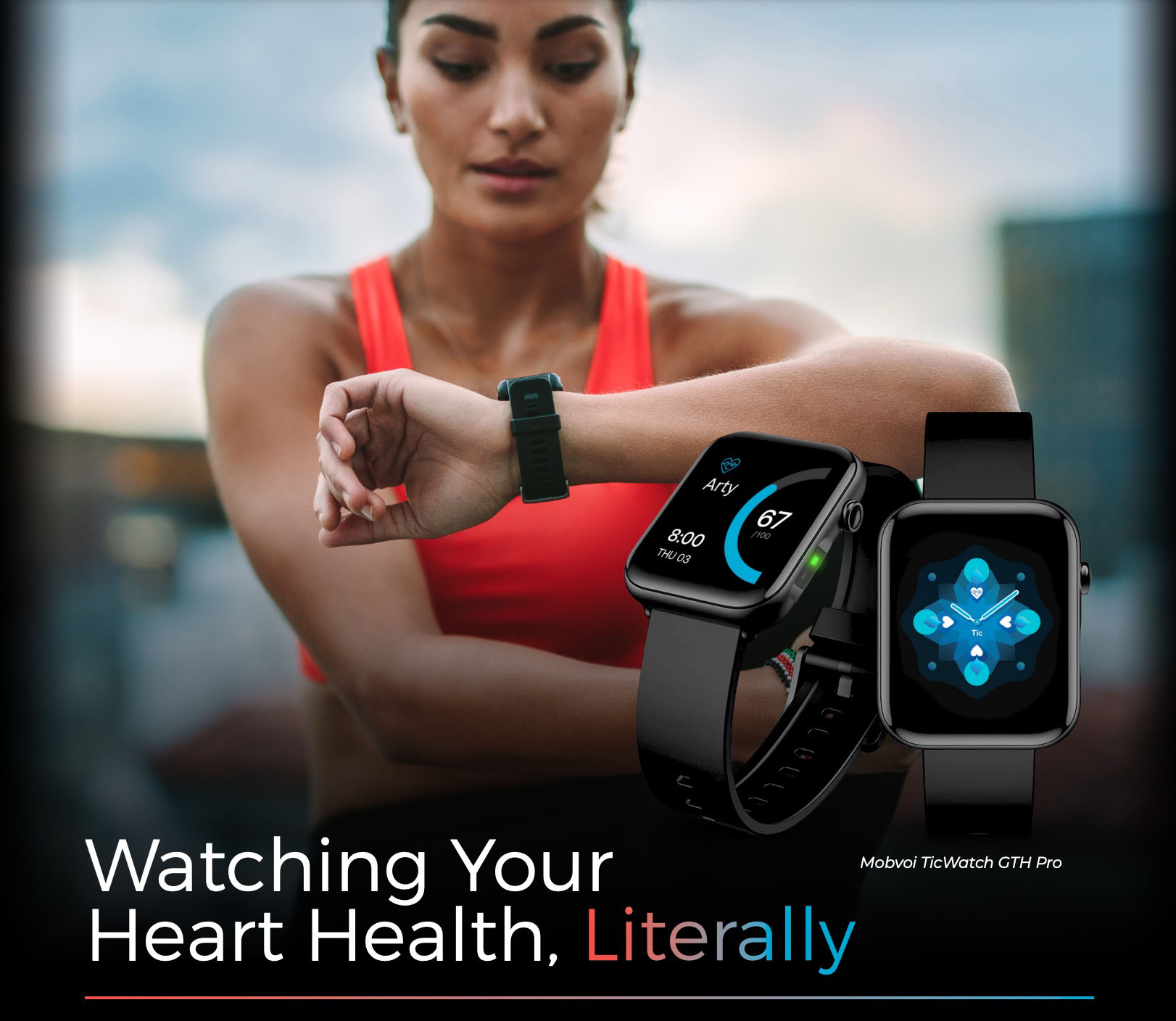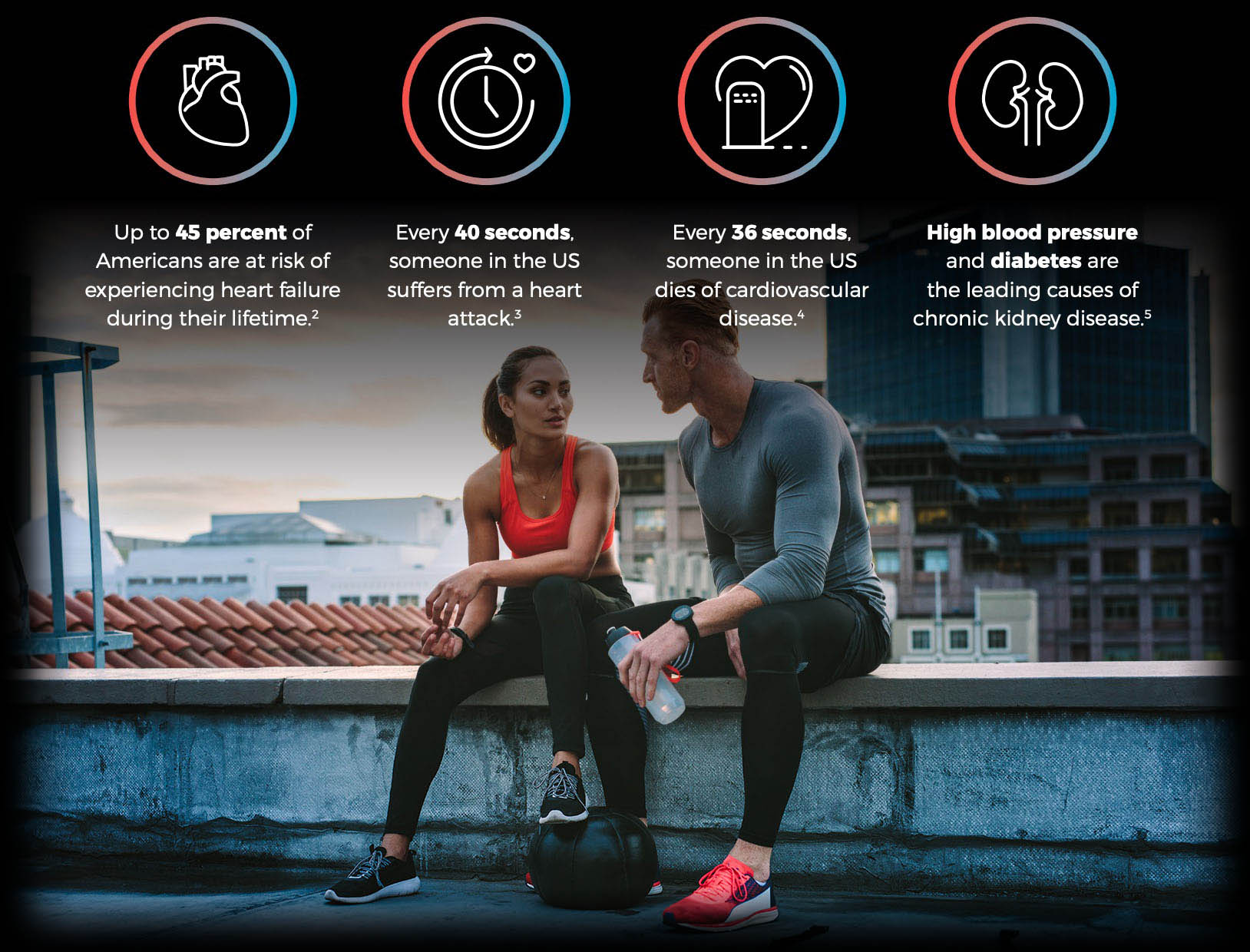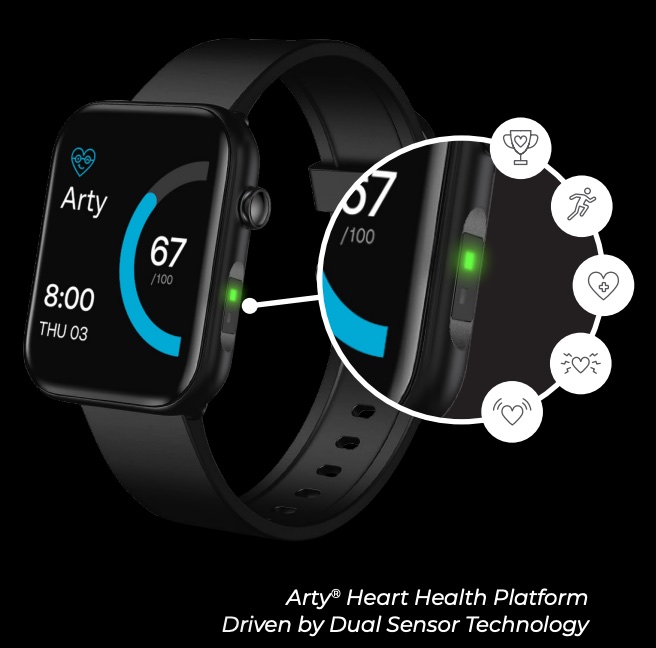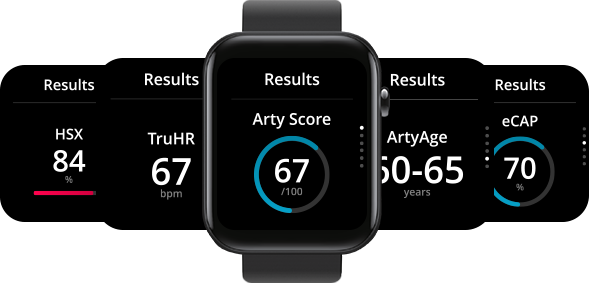
You’ve probably heard it all before: heart disease is the number one killer, so take care of your heart, watch your cholesterol, blood pressure, and weight. But you’re busy, you forget, you get caught up in your life. And it can be challenging not only to know what to do but also to findthe motivation to get it done
The good news is that we’re going to provide you that motivation with Mobvoi’s TicWatch GTH Pro smartwatch featuring Arty® Heart Health powered by ATCOR.
It’s a new tool to help you protect your heart and entire cardiovascular system as well as your kidneys and brain, because all of them require healthy blood flow
What’s the big deal about heart health?
For one thing, heart health is about more than the heart. For example, cardiovascular health refers to the integrity of the heart and all the blood vessels involved in helping to keep the heart functioning optimally. Thus, when a doctor or article mentions cardiovascular disease, it includes coronary heart disease, heart valve issues, heart failure, heart arrhythmias, and stroke.
Then there’s the brain. The direct correlation between heart and brain health is one reason why both the Alzheimer’s Disease Research Center and the American Heart Association have identified seven criteria for ideal cardiovascular health: regular physical activity, healthy diet,
normal weight, not smoking, and adequate control of blood pressure, cholesterol, and blood glucose levels.1
And let’s not forget the kidneys, which require a healthy cardiovascular system to provide the oxygen-filled blood that it needs to cleanse your blood and help regulate blood pressure, among other tasks. Without good kidney function, your cardiovascular system would struggle to operate or stop altogether.
And finally, we have to consider the pulmonary system. Poor lung function affects oxygenation, which means the heart needs to work harder at rest and at load.
The stats are sobering.

Tell me about this smartwatch
The Mobvoi GTH Pro features world-first dual sensor technology that captures and reports information about several critical cardiovascular factors at the touch of your finger. Unlike other wrist-based sensors, it provides arterial data — courtesy of ATCOR’s SphygmoCor® technology — which is not available in any other non-medical wearable devices.
It also features the unique Arty Heart Health platform, whichincludes your Arty Score and its four components. So are you ready to keep score of your heart health?

What is Arty Score?
Arty Score is a general heart health score based on four factors — eCAP® (Exercise Capacity®), ArtyAge™, HSX™ (Heart Stress Index), and TruHR® — that use ATCOR’s proprietary algorithms. The information provided by Arty Score is based on the same ATCOR technology used by specialist clinicians, hospitals, and medical researchers.
Arty Score gives unique, individualized information that can be used to detect trends, determine management options for hypertension and related conditions, and monitor your overall arterial health. The higher your Arty Score, the better your cardiovascular health.
How to improve your Arty Score
You can improve your Arty Score by making lifestyle changes. Most are basic: not smoking, getting six to nine hours of sleep every night, and maintaining your ideal body weight through regular exercise and balanced nutrition. We also have a few more suggestions to help boost your Arty Score below.
ArtyAge
How stiff are your arteries? ArtyAge can give you the answer. High blood pressure (hypertension) causes your arteries to stiffen over time. When arteries in the arms and legs are stiff, the heart has to pump harder to maintain pressure in both. As a result, pressure in the heart becomes increasingly higher and closer to the pressure in the limbs. The smaller the difference between the two pressures, the stiffer the arteries and the older the ArtyAge of the individual. If your ArtyAge is greater than your biological age, it’s a wake-up call to take a look at your overall cardiovascular health and consider adopting some lifestyle changes to improve your score.
How to improve ArtyAge:
- Do more aerobic and/or resistance exercise.
- Make dietary changes: eat more lowfat dairy foods, reduce fat and salt, and eliminate or reduce caffeine.
- Increase intake of Vitamins C and D in foods and/or supplements.
eCAP (Exercise Capacity)
This parameter measures the amount of blood flow to the inner heart muscle. The greater the supplyto-demand ratio of blood (eCAP), the more your heart is protected when you need more oxygenated blood, such as during exercise. If your heart doesn’t get enough oxygenated blood, it may be unable to get oxygenated blood to the rest of the body, and your exercise performance will suffer. eCAP is based on a clinical measurement, otherwise known as the “SEVR Index”.
How to improve eCAP
- Exercise at least 150 minutes per week at moderate intensity.
- Perform a mix of aerobic and resistance exercises.
- Consume more Vitamin C via whole foods or supplements.
HSX (Heart Stress Index)
HSX measures the amount of the burden on your heart from stiff arteries. This factor is essential because long-term stress on the heart and cardiovascular system can result in an enlarged heart (hypertrophy) and heart failure.

How to improve HSX:
- Start or increase High Intensity Interval Training (HIIT) and/or resistance exercises.
- Make dietary changes: avoid or reduce processed foods, eat more vegetables and low-fat dairy, reduce caffeine and alcohol.
- Adopt stress-reducing practices on a daily basis, such as yoga, aerob
- Boost your intake of Vitamins C and D.
- Get adequate sleep, especially REM sleep, which is important for brain function as well as forming and retaining memories. It’s also a time when your heart rate and blood pressure can fluctuate.
TruHR
Although other consumer wearable devices can measure resting heart rate, TruHR is a superior measurement because it provides a consistently accurate reading equivalent to a medical electrocardiogram. A normal resting heart rate for adults ranges from 60 to 100 beats per minute, and generally a lower resting heart rate indicates more efficient heart function and better cardiovascular health. TruHR can help evaluate the risk for cardiovascular and related health conditions in a more precise manner.
Why you should make heart-healthy lifestyle choices
Now that you better understand the parameters that make up your Arty Score, let’s dig a little deeper into some lifestyle changes that will further support your heart health.
Increase exercise: As you have read earlier, varied and increased movement positively impacts all the Arty Health parameters. It’s effective because it promotes improvement in cardiovascular and brain health, it can protect against dementia, and studies also suggest it can reduce cardiovascular and chronic diseases.
Get to bed at the proper time: A new study from the U.K. says that the “sweet spot” for bedtime between 10:00 pm and 11:00 pm is best for heart health. These new findings are part of an increasing body of evidence that supports the thinking that how we sleep and when we sleep may have a substantial impact on cardiovascular health.
Make your diet work for you: You can approach a heart-healthy diet in several ways, depending on your needs. For example, the Dietary Approaches to Stop Hypertension (DASH) eating plan is rich in vegetables, fruits, and low-fat dairy foods; lower in saturated fat, total fat, and cholesterol; and includes protein from various sources. In addition, time-restricted eating, also known as intermittent fasting, has also gained popularity. As it has been shown to improve different risk factors, such as blood pressure, blood sugar levels, total and LDL cholesterol, intermittent fasting can also be beneficial for heart health.

Bottom Line
The motivation you need to take better care of your heart health can be at your fingertips and on your wrist when you are wearing the TicWatch GTH Pro. The smartwatch and your Arty Score are important tools to help you take charge of your heart and cardiovascular health.


Notes
- Alzheimer’s Disease Research Center. Life’s Simple 7: Your Cardiovascular Health.
- Lin, MP et al. “Life’s Simple 7” and Long-Term Mortality After Stroke. Journal of the American Heart Association vol. 4,11 e001470. 20 Nov. 2015, doi:10.1161/JAHA.114.001470.
- Fryer, CD et al. Prevalence of uncontrolled risk factors for cardiovascular disease United States, 1999-2010. NCHS data brief no 103. National Center for Health Statistics; 2010.
- Centers for Disease Control and Prevention. Underlying cause of death, 1999-2018. CDC WONDER Online Database. Atlanta, GA: Centers for Disease Control and Prevention; 2018.
- Kidney disease statistics for the United States. National Institute of Diabetes and Digestive and Kidney Diseases. National Institutes of Health.